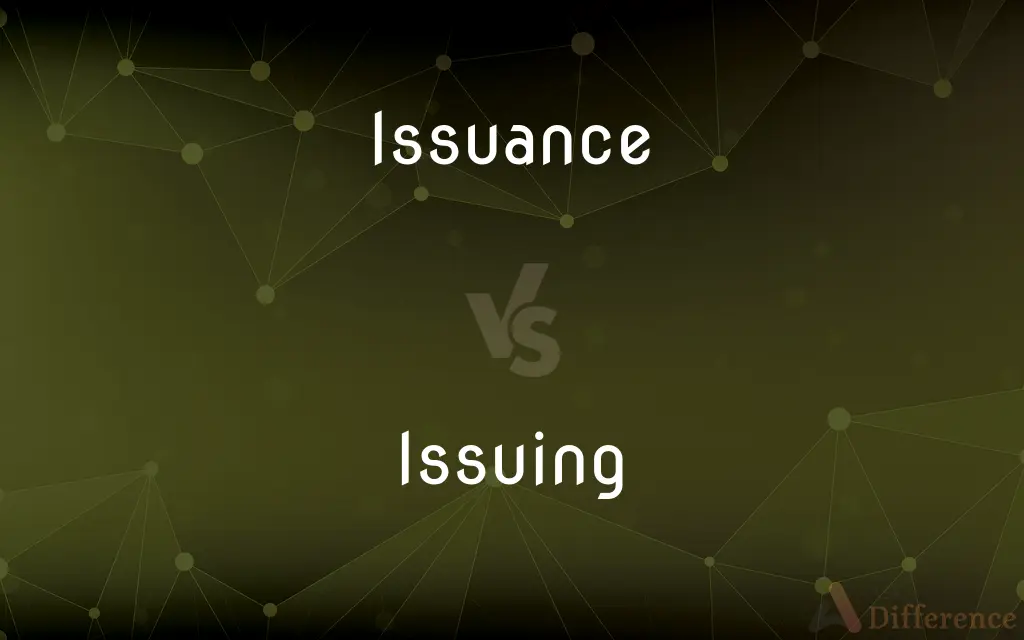Issuance vs. Issuing — What's the Difference?
By Tayyaba Rehman & Urooj Arif — Updated on April 5, 2024
Issuance refers to the act of making something available or official, often in the context of documents or securities, while issuing is the process or action of providing or distributing something to people.

Difference Between Issuance and Issuing
Table of Contents
ADVERTISEMENT
Key Differences
Issuance is a noun that specifically denotes the act or process of officially releasing or making available something, such as shares, bonds, or official documents. It implies a formal or legal process, often associated with a one-time event or a series of events under specific regulations. On the other hand, issuing is a gerund or present participle form of the verb "issue," representing the ongoing action or process of distributing, releasing, or providing things to people or entities. It can apply to a wide range of contexts beyond the formal or financial, including everyday scenarios where items or information are distributed.
The term issuance is particularly common in financial and legal contexts, where it refers to the creation and distribution of financial instruments or the formal release of documents. For example, the issuance of shares refers to the process by which a company makes shares available to investors, often through a public offering. Issuing, while it can be used in similar contexts, has a broader application. It can describe the action taken by any party that distributes or releases something, from issuing tickets at a theater to issuing commands in a software program.
In practice, the issuance of a document or security involves a series of regulated steps, including approval, creation, and distribution, following specific legal and procedural guidelines. This contrasts with issuing, which focuses more on the act of distribution itself and can involve a continuous or repeated process. For instance, a government department might be involved in the issuance of passports—a complex process requiring application reviews and approvals—whereas the same department is issuing these passports as they print and distribute them to citizens.
The distinction between the two also highlights the level of formality and specificity. Issuance often carries a weight of authority and finality, indicating that something has been officially made available following established protocols. Issuing, by comparison, is more general and can refer to any act of handing out or distributing, regardless of the formalities involved.
Issuance is typically used in contexts where the focus is on the outcome or the event of making something available, especially something of legal, financial, or official significance. Issuing, however, emphasizes the ongoing or repeated nature of the action, making it applicable in both formal and informal contexts. This difference reflects the unique roles these terms play in communication, highlighting the nuances of English language usage in varying scenarios.
ADVERTISEMENT
Comparison Chart
Definition
The act or process of making something officially available, especially documents or financial securities.
The action or process of providing or distributing something.
Context
Formal, often used in legal, financial, or official scenarios.
Broad, applicable in formal and informal scenarios.
Formality
High, implies a structured and often regulated process.
Variable, can be formal or informal depending on context.
Focus
On the event or outcome of making something available.
On the action of distribution or provision.
Examples
Issuance of bonds, passports, or licenses.
Issuing tickets, commands, or warnings.
Compare with Definitions
Issuance
The act of making something available officially.
The company announced the issuance of new shares.
Issuing
Releasing or publishing.
The author is issuing a revised edition of her book.
Issuance
Provision of legal documents.
The issuance of the permit took several weeks.
Issuing
Providing information or directives.
The officer is issuing a warning.
Issuance
Formal release of financial securities.
The issuance of bonds raised the needed capital.
Issuing
Making available or accessible.
The software update is being issued next week.
Issuance
Creation and release of digital certificates.
The issuance of digital IDs enhances online security.
Issuing
The process of giving out something.
The library is issuing new cards.
Issuance
Official distribution of items under regulation.
The government controls the issuance of currency.
Issuing
Distributing items to individuals.
The company is issuing refunds to affected customers.
Issuance
The act of issuing.
Issuing
A point or matter of discussion, debate, or dispute
What legal and moral issues should we consider?.
Issuance
An issue.
Issuing
A matter of public concern
Debated economic issues.
Issuance
The act of issuing, or giving out.
The issuance of an order; the issuance of rations
Issuing
A misgiving, objection, or complaint
Had issues with the plan to change the curriculum.
Issuance
The act of issuing, or giving out; as, the issuance of an order; the issuance of rations, and the like.
Issuing
A problem or difficulty.
Issuance
The provision of something by issuing it (usually in quantity);
A new issue of stamps
The last issue of penicillin was over a month ago
Issuing
A personal problem
Is convinced that her boss has issues.
Issuing
The act of circulating, distributing, or publishing by a business, government, or organization
Government issue of new bonds.
Issuing
An item or set of items, as stamps or coins, made available at one time by a business, government, or organization.
Issuing
A single copy of a periodical
The May issue of the magazine.
Issuing
A distinct set of copies of an edition of a book distinguished from others of that edition by variations in the printed matter.
Issuing
Proceeds from estates or fines.
Issuing
Something proceeding from a specified source
Suspicions that were the issue of a deranged mind.
Issuing
A culminating point leading to a decision
Bring a case to an issue.
Issuing
A final result or conclusion, as a solution to a problem.
Issuing
The act or an instance of flowing, passing, or giving out
Where the lake gives issue to its waters.
Issuing
A place of egress; an outlet
A lake with no issue to the sea.
Issuing
A lesion, wound, or ulcer producing such a discharge.
Issuing
Offspring; progeny
Died without issue.
Issuing
To flow, go, or come out
Water issuing from a spring.
Voices issuing from a room.
Issuing
To proceed from a source; emerge or come forth
Ideas issuing from a discussion. ].
Issuing
Present participle of issue
Issuing
The act by which something is issued.
The issuings and transactions of stocks
Issuing
That which issues from a source.
The issuings of nature's springs
Issuing
The act of issuing; putting out.
Issuing
The provision of something by issuing it (usually in quantity);
A new issue of stamps
The last issue of penicillin was over a month ago
Common Curiosities
Is issuing always related to physical items?
No, issuing can refer to both physical items (like equipment or books) and non-physical items (such as commands, licenses, or updates).
How does the public perceive issuance vs. issuing?
Public perception varies; issuance is often viewed as a formal, official process, while issuing is seen as a more general action of distribution or provision, with less emphasis on formality.
Can the issuance of documents be reversed?
While some issued documents can be revoked or invalidated under specific conditions, the formal act of issuance itself, especially for financial securities, typically represents a final and irreversible step.
What is the significance of issuance in financial markets?
In financial markets, issuance is crucial as it refers to the process through which new securities, like stocks or bonds, are created and made available to investors, impacting market supply and potentially the issuing entity's capital structure.
What role does technology play in the issuance and issuing processes?
Technology streamlines both processes, enabling the digital issuance of securities, documents, and licenses, as well as the electronic issuing of tickets, updates, and communications, increasing efficiency and accessibility.
Can an individual perform an issuance?
While individuals might not typically engage in formal issuance processes (which are often associated with institutions and involve legal or financial instruments), they can issue things in a more general sense, such as invitations or instructions.
How does issuance affect a company's value?
The issuance of shares can dilute existing ownership but also raise capital, potentially increasing the company's value if used effectively. The impact depends on investors' perceptions and the purpose of the capital raised.
Are there regulations governing the issuance of securities?
Yes, the issuance of securities is heavily regulated by governmental agencies to protect investors, ensure market transparency, and prevent fraud.
Can issuing be considered a part of the issuance process?
Yes, issuing can be seen as a component of the broader issuance process, particularly in the context of distributing the items or documents that have been formally made available through issuance.
What challenges are associated with issuing digital assets?
Issuing digital assets involves challenges related to security, regulatory compliance, and ensuring the integrity and authenticity of the digital items or currencies being distributed.
Is there a difference in legal responsibility between issuance and issuing?
Yes, legal responsibilities can differ; issuance, especially of legal or financial instruments, often carries specific regulatory obligations and standards, whereas the responsibilities associated with issuing may be broader and less strictly regulated.
How does international law impact issuance and issuing?
International law can impact the issuance and issuing of securities, documents, and digital assets, especially in terms of compliance, cross-border regulation, and recognition of legal documents or financial instruments.
Share Your Discovery

Previous Comparison
Symbol vs. Key
Next Comparison
Mount vs. MountainAuthor Spotlight
Written by
Tayyaba RehmanTayyaba Rehman is a distinguished writer, currently serving as a primary contributor to askdifference.com. As a researcher in semantics and etymology, Tayyaba's passion for the complexity of languages and their distinctions has found a perfect home on the platform. Tayyaba delves into the intricacies of language, distinguishing between commonly confused words and phrases, thereby providing clarity for readers worldwide.
Co-written by
Urooj ArifUrooj is a skilled content writer at Ask Difference, known for her exceptional ability to simplify complex topics into engaging and informative content. With a passion for research and a flair for clear, concise writing, she consistently delivers articles that resonate with our diverse audience.















































